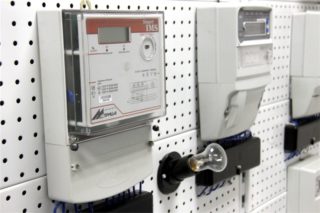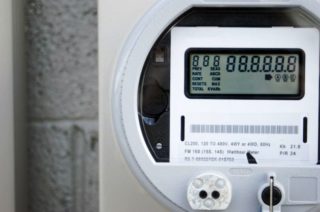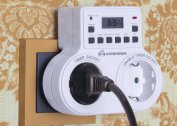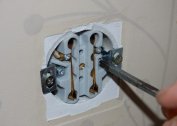Modern electric meters automate the process of taking readings and their remote transmission. This allows tenants and owners to pay utility bills remotely via the Internet, saving their time. The legislative framework is constantly being improved and undergoes changes.
What is a smart electricity meter
Smart electric meters got this name due to the fact that without human intervention they transmit readings to the information networks of companies for calculations. But the advantages of the device do not end there: they reduce bills to pay for utilities. This can be explained by the fact that the accrual process is transparent, as far as possible, and minimizes the loss of resources.
Automatic sending of readings eliminates the possibility of submitting incorrect information or making mistakes - due to this, tangible savings occur. There will be no delays, the "smart" device will do everything on its own in the required time. There are not only smart electric meters, but also water meters, gas devices.
There are not so many differences between smart electricity meters and ordinary meters. The main difference is the installation of the controller, which transfers information in an automated mode. Otherwise, the design features of electric meters are the same.
Principle of operation
A smart electric meter is considered an automated special device whose main task is to collect data on the amount of resources consumed. The optimal frequency of data transmission to information nodes of companies is once within 60 minutes.
Electricity, water and gas charges increase annually. Thanks to this, the demand for smart devices is growing daily. They are installed in reconstructed buildings and new homes.
Switching to improved types of metering devices offers many benefits, including practicality and benefits.
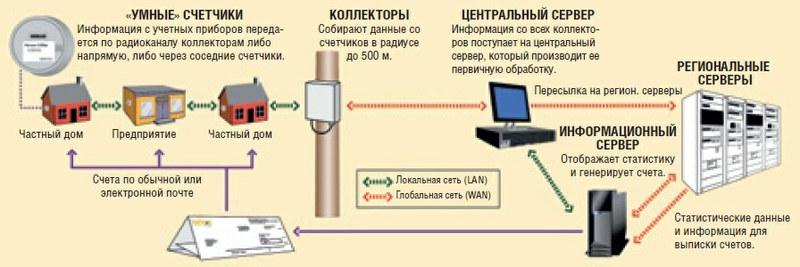
The device consists of two main parts - the controller, which is responsible for data transfer, and the counter. Data transfer is carried out in several ways, it depends on the type of controller installed. The most modern and budget view is a wireless controller. With its help, data transmission can be carried out in one of the following ways:
- GPRS - connects via a standard SIM card for mobile communications, it needs to be regularly replenished. Information is fed to the servers via public cellular.
- LPWAN - the technology has much in common with the previous method of data transfer, but it is less energy-consuming. Data is supplied thanks to special towers, the main task of which is the communication of controllers with the server.
- Wi-Fi is the most advanced technology that combines all the advantages of the previous two methods of data transfer. Due to its low power consumption, the controller can run on battery power.
In apartment buildings or industrial enterprises, it is better to use the first method of data transfer, the second is more suitable for houses that are located away from cities.
Advantages and disadvantages of smart electricity meters
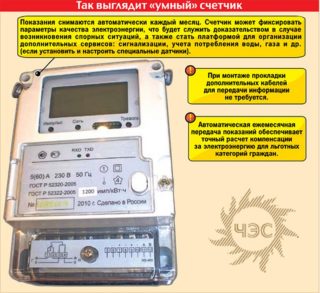 Statistics say smart meters can reduce monthly utility bills by up to 30%. However, in the process of use, a large number of nuances may arise.
Statistics say smart meters can reduce monthly utility bills by up to 30%. However, in the process of use, a large number of nuances may arise.
Advantages of smart appliances:
- Comfortable use. Installation of advanced equipment can simplify life and make it more comfortable. The only thing required of the tenant is to pay for services on time.
- There is an opportunity to switch to a new multi-tariff payment system that is more beneficial for consumers.
It is worth noting the dignity of using such devices for public services, since managerial posts can reduce staff due to the lack of the need to collect evidence.
Modern equipment has the following disadvantages:
- Stable Internet coverage is required, otherwise the switch will start to malfunction, and the testimony may not be delivered on time.
- The high cost of smart metering devices.
- Like any other electric device, the meter needs a stable and high-quality supply of electricity, otherwise the device will fail.
Despite the large number of advantages, such meters due to the high cost pay off after a few years, if not more.
Smart Metering Legislation
In December 2018, in the third reading of the State Duma, the law on “smart meters” was adopted, the main task of which is to ensure the rapid development of intelligent electricity metering systems throughout Russia. The bill is amended regularly.
The law states that as old electricity meters begin to fail, starting in July 2020, they will be replaced by new smart electricity meters. From 2021, smart meters will be forced into operation. Their installation, configuration and maintenance will have to deal with network companies and suppliers.
In the future, the consumer will not be liable for the acquisition, installation and further maintenance. An exception is the placement of the device indoors or in private property.
Problems and features
Installation does not always imply an unhindered approach to the device. In this case, special devices are additionally used to remotely monitor the readings and also pay for them.
The cost of an intelligent meter is influenced by two fundamental factors:
- the cost of the electric meter itself;
- the price of the controller, which is responsible for collecting and transmitting information to servers.
The cost of advanced equipment is also affected by the accuracy class of the meter, type of mains voltage and manufacturer. It will be possible to save the family budget only if you install a smart electric meter on several apartments at the same time, but this can be realized only if all the devices are on the common panel in the entrance.
You can purchase an intelligent metering device yourself from official representatives, it is recommended to give preference to leading brands. The cost of installation and configuration is about 6-7 thousand rubles, one setup will be cheaper - about 4 thousand. The price of the controller itself ranges from 3 to 10 thousand rubles.
An electric meter with a control panel is no different from traditional or smart metering devices. The only difference is the additional equipment with a remote control that turns off the equipment to save energy consumed by it.
